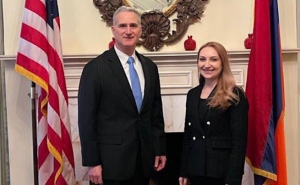TTIP: Who Gains, Who Loses?

On May 2, 2016 Greenpeace non-governmental environmental organization based in Netherlands has published 248 pages of leaked Transatlantic Trade and Investment Partnership (TTIP) negotiating texts, which so far has been negotiated between the EU and the US. The document has revealed a number of problematic issues, which have become an active topic of discussion and, in a sense, confirmed the criticism previously raised by the TTIP skeptics.
Before passing to those critical points, it should be reminded that negotiations on TTIP between the US and the EU countries started two and a half years ago and the sides aimed at reaching an agreement before November 2016 that is before the US elections (as several candidates, such as Clinton, Sanders, Trump, have already expressed concerns about TTIP). In case the agreement is reached it will present the world’s largest trade deal as the EU and the US economies comprise about half of the entire world’s GDP. The aim of the deal is to get rid of the remaining obstacles that impede trade between the US and the EU countries.
The leaked documents prove that in case the agreement is reached the trade between the EU and the US aims at overcoming a number of food safety and environment protection laws that are stricter in the EU countries as opposed to the ones in the US. In addition, from those documents it becomes obvious that the European Commission will be obliged to consult with the US authorities before adopting new legislative proposal. The experts have fears that the agreement will allow business to have an influence on the politics, which they consider a big threat to the European democracy, the Independent reports.
All in all it is interesting to know who will mostly benefit in case the deal is signed. According to the calculations of the European Commission, once the deal is signed it will boost the economy of the EU by 120 billion Euros, while the US economy by 90 billion Euros. No matter how profitable the deal may seem, the Europeans are to face hard choice between economic benefits on the one hand and political, environmental and health benefits on the other hand.
If the criticism and the fears of the Europeans are known, it will also be interesting to know how the critics of the deal explain their position in the US. For example, the US presidential candidate Hillary Clinton last year commenting on the trade deal noted:
"I have said from the very beginning that we had to have a trade agreement that would create good American jobs, raise wages and advance our national security. And I still believe that’s the high bar we have to meet," Huffington Post reports.
In his turn republican front runner Donald Trump also criticized the trade deal noting: "The Trans-Pacific Partnership is an attack on America's business," CNN reports.
However, unlike Europe, there are no mass protests in the US against the TTIP. And it is quite natural because as the leak documents also reveal the side that should go to the main concessions is the Europeans who should again sacrifice their rules and values to economic interests.
Other materials on this subject
- FT: Coronavirus Pandemic Threatens Livelihoods of 59m European Workers Under McKinsey’s pessimistic scenario, in which severe social distancing restrictions are maintained through the summer to contain the spread of the virus, EU unemployment could double to 11.2 per cent...
- Italy Coalition Agrees on New Budget, Expects EU Approval The European Commission rejected the Italian budget in October, saying it would not lower the country’s huge debt and declaring it in clear breach of EU fiscal rules. Rome submitted a revised plan last...
- EU Shoots Down Italy's Budget Plans, Again The Commission confirmed its assessment that "Italy's draft budget plan is in particularly serious non-compliance" with EU debt rules, Commission Vice President Valdis Dombrovskis said in Brussels.
- Denmark Is The Most Expensive EU Country Denmark was followed by Luxembourg (127 percent), Ireland and Sweden (both 125 percent), Finland (122 percent) and the United Kingdom (117 percent).
- Eurozone Growth Exceeds Expectations For the past 12 months, the growth rate was 2.5%.
Other materials on this subject
- Turkey is sending Cold War-era cluster bombs to Ukraine – FP The weapons are designed to destroy tanks by bursting into smaller submunitions, which can linger on the battlefield for years if they do not immediately explode. Each round scatters about 88 bomblets.
- Los Angeles mayor and city council president address US president on Lachin corridor issue Thank you, Mayor Bass, for joining me in communicating to President Biden the urgent need for U.S. leadership to lift the blockade and bring humanitarian relief to the people of Artsakh.
- US Committed to Helping Armenia and Azerbaijan Resolve Issues Peacefully: Blinken Spoke With Pashinyan The Secretary reiterated our commitment to helping Armenia and Azerbaijan resolve issues peacefully.
- Iran to Submit Final Conclusion Over Nuclear Deal Revival by Midnight In comments on Monday, Amirabdollahian said Iran is going to send its final conclusion about the JCPOA talks to the European coordinator in written form at midnight.
- Erdogan, Biden Might Meet in September- Media Turkey plans to buy 40 F-16 fighter jets from the US and upgrade another eighty. US President Joe Biden stated that he expects to receive the approval of the [US] Congress to sell F-16 fighter jets to...
Other materials on this subject
- The European Union Has Decided to Abandon Russian Coal In the Summer Many countries have joined these sanctions, even if this necessarily implies economic costs for ourselves," he noted.
- Germany Faces Steep Recession if Russian Oil and Gas Halted, Bank Lobby Says "The situation would be even worse if imports or supplies of Russian oil and natural gas were to be halted. A significant recession in Germany would then be virtually unavoidable," Sewing told journalists.
- EU Leaders Agree on Joint Gas Purchases Last year, the European Commission proposed to the EU countries a system of joint purchases of strategic gas reserves as a way to provide a buffer against possible supply disruptions. Fears of supply disruptions...
- European Union Launches “Team Europe” Package to Support Partner Countries with More than €20 Billion: Reuters Most of the money is being reallocated from other, less urgent EU foreign aid schemes in the EU’s common budget, but Borrell said the European Investment Bank, the European Bank for Reconstruction and...
- The Guardian: EU Leaders Clash Over Economic Response to Coronavirus Crisis Meeting via a video link, the EU’s 27 leaders papered over deep divisions by agreeing that another fortnight was needed to discuss ambitious economic recovery plans. After a testy debate over "coronabonds",...
-
 17:08
17:08The regular session of the Anti-corruption Policy Council takes place in Jermuk
-
 15:05
15:05The Prime Minister sends congratulatory messages to the supreme leader of Iran and the President of Iran
-
 11:11
11:11Armenia sends earthquake aid to Turkey
-
 10:43
10:43Commemoration of the Pontiff St. Sahak Partev
-
 09:16
09:16Some roads are closed and difficult to pass in Armenia
-
 19:55
19:55Phone conversation of the Foreign Minister of Armenia with the U.S. Assistant Secretary of State for European and Eurasian Affairs
-
 18:30
18:30Prime Minister Pashinyan and President Khachaturyan meet
-
 18:20
18:20Ararat Mirzoyan with Co-Chairman of the OSCE Minsk Group of France Brice Roquefeuil
-
 17:01
17:01Humans could land on Mars within 10 years, Musk predicts
-
 16:45
16:45France, US urge 'immediate' end to Nagorno Karabakh blockade
-
 16:01
16:01Blockaded Nagorno Karabakh launches fundraiser to support quake-hit Syria
-
 15:59
15:59Earthquake death toll in Turkey rises to 18,342
-
 15:43
15:43Ararat Mirzoyan Held a Telephone Conversation with Sergey Lavrov
-
 15:06
15:06French president rules out fighter jet supplies to Ukraine in near future
-
 14:47
14:475 Day Weather Forecast in Armenia
-
 14:44
14:44President Vahagn Khachaturyan wrote a note in the book of condolences opened in the Embassy of Syria in Armenia
-
 14:20
14:20Azerbaijan’s provocations impede establishment of peace and stability – Armenian FM tells Russian Co-Chair of OSCE MG
-
 12:57
12:57France representation to OSCE: Paris calls on Azerbaijan to restore freedom of movement through Lachin corridor
-
 11:40
11:40Command of Kosovo forces highly appreciated preparation of Armenian peacekeepers
-
 10:16
10:16The United States withdrew from sanctions against Syria for six months the provision of assistance after the earthquake
day
week
month
Humidity: %
Wind: km/h









